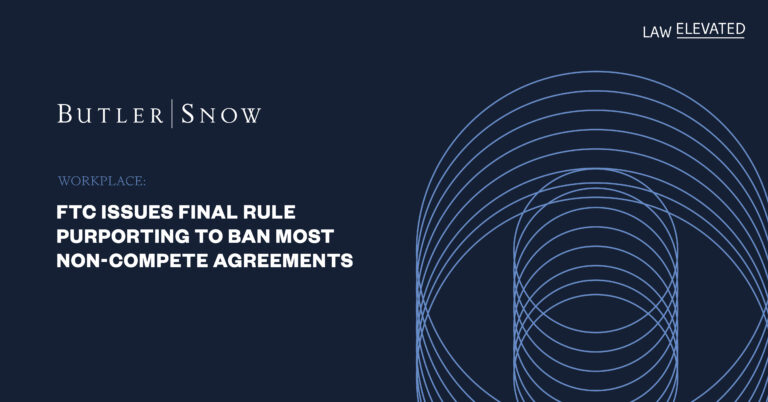On April 23, 2024, the Federal Trade Commission (“FTC”) voted 3-2 to issue a new rule that will dramatically impact employers that use noncompete agreements to protect their business interests. In January 2023, the FTC issued a proposed rule and invited public comments. Now, 14 months and more than 26,000 comments later, the FTC has issued a final rule very similar to the proposed rule. The FTC has determined that the vast majority of noncompete agreements are an unfair method of competition, and therefore, a violation of Section 5 of the FTC’s governing Act. The only exceptions are noncompete restrictions that are entered into in connection with a sale of a business (or asset purchase) and those entered into with certain senior executives.[1] Answers to some key questions are set forth below:
Q. When is the new rule in effect?
A. The rule will take effect 120 days after it is published in the Federal Register (which will likely be soon). As set forth below, however, if the rule is challenged, a court could issue a “stay” which would stay that timetable.
Q. Will the new rule survive a court challenge?
A. That is the million dollar question. The FTC may only enact rules that are within the authority that it has been delegated by Congress. 2 of the 3 FTC Commissioners who voted against enacting the new rule predicted that the rule “won’t survive legal challenge” on the basis that the FTC exceeded its authority, and many in the legal community agree. The U.S. Chamber of Commerce has already announced that a court challenge is imminent (and many anticipate that a federal court in Texas will be the first to weigh in on the issue). Referring to the new rule as “a blatant power grab that will undermine American businesses’ ability to remain competitive,” the Chamber’s CEO stated that it will “sue the FTC to block this unnecessary and unlawful rule and put other agencies on notice that such overreach will not go unchecked.” It is very possible that a federal court will issue an injunction preventing the rule from going into effect and that, ultimately, the Supreme Court will decide whether the rule is unlawful.
Q. What is the senior executive exception?
A. The new rule does not prohibit existing noncompetes applicable to an employee who: (a) earns at least $151,164; and (b) is someone with “policy-making authority.” The rule defines “policy-making authority” as “final authority to make policy decisions that control significant aspects of a business entity or common enterprise and does not include authority limited to advising or exerting influence over such policy decisions or having final authority to make policy decisions for only a subsidiary of or affiliate of a common enterprise.” This exception was not included in the proposed rule but was added to the final rule in response to comments received by the FTC.
Q. What does the “sale of business” exception entail?
A. The rule does not apply to noncompete provisions entered into “pursuant to a bona fide sale of a business entity, of the person’s ownership interest in a business entity, or of all or substantially all of a business entity’s operating assets.” The final rule is different than the proposed rule which required the individual to be a “substantial” owner in order to be bound.
Q. Are there any other exceptions?
A. The rule does not apply where a cause of action related to a non-compete accrued prior to the effective date. Also, certain businesses (such as certain banks and air carriers) that are not subject to the FTC’s jurisdiction need not comply with the rule.
Q. What happens to my company’s existing noncompete agreements?
A. If the rule survives legal challenges, existing agreements will be rescinded and employers will be required to notify both existing and former employees by the “effective date” that the agreements will not be enforced. To aid employers’ compliance with this requirement, the FTC included model language in the final rule that employers may use to communicate to workers.
Q. Does the proposed rule also prohibit nonsolicitation provisions?
A. Probably not. However, a non-solicitation or non-disclosure agreement could be invalid if it is worded so broadly as to have the effect of prohibiting new employment.
Q. Does this apply to noncompete agreements between businesses?
A. No. Existing federal antitrust law, however, would continue to apply to restrictive covenant agreements in those relationship contexts.
Q. But under the law of my state, my noncompete agreements are enforceable. Does state law prevail?
A. No. The federal rule if enacted (and upheld) would trump and supersede state law. To the extent that state law is more restrictive than the rule, it likely would continue to apply.
Q. Is there anything our business should be doing in the meantime?
A. At this juncture, we recommend that companies not change their existing practices and give this some time to play itself out in the court system. Recently, there have been a number of laws and rules that were enacted but never saw the light of day because they didn’t survive court challenges. That said, employers should be mindful that there may be a scenario in which nearly all (if not all) of their noncompete agreements are deemed invalid and be in a position to promptly notify their employees that they are invalid. Employers should consult with employment law counsel and keep abreast of court developments.
[1] Certain businesses (such as certain banks and air carriers) that are not subject to the FTC’s jurisdiction are also not bound to comply with the rule.
